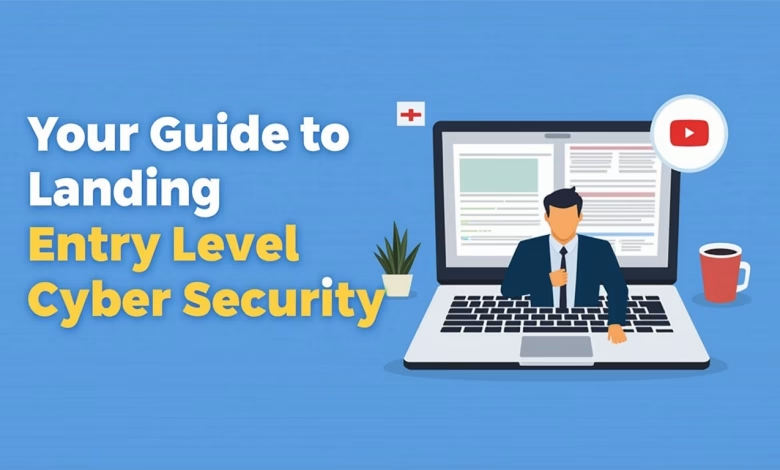Your Guide to Landing Entry Level Cyber Security Jobs

Your Guide to Landing Entry-Level Cyber Security Jobs
The world is increasingly interconnected, and with that comes a growing need for experts to keep data secure. If you’re intrigued by problem-solving, technology, and protecting critical information from cyber threats, a career in cyber security could be the perfect path. But where should you begin?
Entry-level cyber security jobs offer a gateway into this in-demand field, and the best part is—you don’t always need years of experience to get started. Whether you’re just graduating or making a career change, this guide will walk you through everything you need to know to break into cyber security. We’ll explore job opportunities, required skills, certifications, and tips to boost your chances of success.
Why Choose a Career in Cyber Security?
1. Thriving Job Market
Cyber security jobs are booming. According to CyberSeek, there are over half a million unfilled cyber security positions in the U.S. alone. Businesses, governments, and organizations of all sizes need skilled professionals to safeguard data and prevent breaches.
And it’s not just about demand—cyber security jobs often come with excellent salaries. Entry-level roles typically start around $50,000–$70,000 annually, while experienced professionals can earn six figures.
2. A Future-Proof Career
The digital age isn’t slowing down, and neither are cyber threats. With increasing technological dependence, cyber security professionals will continue to play a vital role for decades to come.
3. Accessible Entry Points
Unlike some technical fields, cyber security doesn’t always require a computer science degree to get started. Many roles are open to candidates with the right skills, certifications, and determination.
4. Opportunities for Growth
Cyber security is incredibly diverse. From ethical hacking to risk management, once you break into the field, you’ll have opportunities to specialize in areas that align with your interests.

What Are Entry-Level Cyber Security Jobs?
Many positions in cyber security don’t require extensive experience, making them perfect for beginners. Here are some common entry-level roles to consider:
1. Cyber Security Analyst
One of the most popular starting roles, cyber security analysts help monitor and protect an organization’s network. This includes identifying threats, responding to incidents, and implementing security measures to prevent breaches.
Key Skills:
- Network monitoring tools like Wireshark
- Knowledge of firewalls, IDS/IPS
- Familiarity with security frameworks like NIST and ISO
Average Salary: $65,000–$75,000 per year
2. IT Support Specialist
IT support specialists manage an organization’s IT infrastructure, ensuring all systems run smoothly. While this isn’t strictly a cyber security role, it’s a great starting point to gain technical experience and move to a security-focused position.
Key Skills:
- Troubleshooting
- Basic networking knowledge (TCP/IP, DNS)
- Communication skills
Average Salary: $45,000–$60,000 per year
3. Junior Penetration Tester (Ethical Hacker)
Get hands-on with ethical hacking by testing an organization’s systems for vulnerabilities. Junior “pen testers” work under supervision to simulate attacks and help enhance security.
Key Skills:
- Basic coding (Python, Bash)
- Understanding of vulnerabilities and exploits
- Familiarity with tools like Metasploit and Burp Suite
Average Salary: $60,000–$80,000 per year
4. Security Operations Center (SOC) Analyst
SOC analysts monitor real-time activity across an organization’s network. They work as the “frontline defenders,” identifying potential threats and escalating issues to the appropriate teams.
Key Skills:
- Incident detection tools like SIEM (e.g., Splunk)
- Incident response processes
- Analytical mindset
Average Salary: $55,000–$70,000 per year
5. Risk Analyst
Risk analysts evaluate potential vulnerabilities across an organization. They focus on compliance and help ensure the company’s systems meet security standards and implement proper risk mitigation strategies.
Key Skills:
- Data analysis
- Knowledge of risk assessment frameworks
- Communication with non-technical teams
Average Salary: $50,000–$65,000 per year
What Skills Do You Need for Entry-Level Cyber Security Jobs?
Cyber security roles can vary, but some core skills can help you stand out when applying for entry-level positions:
- Networking Basics:
Understand how networks function, including protocols like TCP/IP, DNS, and SSL.
- Programming Skills:
Knowing how to write or read basic code in Python, JavaScript, or Bash is a huge plus.
- System Administration:
Familiarize yourself with operating systems like Windows and Linux—especially Linux, a favorite among cyber security professionals.
- Understanding Cyber Attacks:
Know how hackers operate. Learn about malware, phishing, and social engineering tactics to understand what you’ll defend against.
- Soft Skills:
Problem-solving, attention to detail, and clear communication are invaluable in any cyber security role.
Top Certifications to Boost Your Resume
Certifications can help you stand out as an entry-level candidate, especially if you don’t have a degree. Here are some highly recommended ones to start with:
- CompTIA Security+
A foundational certification that covers key concepts in cyber security, like cryptography, threat management, and network security.
- Certified Ethical Hacker (CEH)
Great for aspiring penetration testers, this certification trains you to identify vulnerabilities and simulate attacks.
- CompTIA Network+
A basic cert to build your understanding of networking concepts—essential for any role in cyber security.
- Systems Security Certified Practitioner (SSCP)
Perfect for those interested in roles like security administrators or SOC analysts.
- Google IT Support Professional Certificate (Bonus)
While not a pure cyber security certification, this online course can give you a head start on technical support roles that lead to security opportunities.

How to Land Your First Cyber Security Job
1. Build Your Knowledge
Take advantage of free and affordable learning platforms like Coursera, Udemy, and specialized cyber security sites. Massive open online courses (MOOCs) can give you the theoretical and practical knowledge you’ll need.
2. Work on Projects
Hands-on experience is crucial. Use free resources like TryHackMe or Hack The Box to practice penetration testing in simulated environments. Set up your own lab at home with VMs (virtual machines) to learn system administration and security configurations.
3. Network in the Industry
Networking isn’t just a tech skill—it’s essential for finding opportunities. Attend cyber security meetups, webinars, or conferences like DEFCON to mingle with professionals in the field.
4. Tailor Your Resume
Highlight relevant projects, internships, or certifications on your resume. Be specific—mention the tools and techniques you’ve worked with.
5. Start Small
Consider internships, volunteer roles, or freelance gigs to gain experience. Sometimes, starting in IT support or system administration can provide a launchpad for more security-specific roles.
Future Growth in Cyber Security
Once you’ve landed your entry-level role, the sky’s the limit. Many areas within cyber security offer rewarding career paths, such as:
- Incident Response Leader: Coordinate and lead responses to major security events.
- Security Consultant: Work with clients to assess vulnerabilities and develop defenses.
- Cyber Forensics Analyst: Investigate breaches and uncover attackers’ methods.
- Chief Information Security Officer (CISO): Lead an organization’s entire security posture.
Final Thoughts on Entry-Level Cyber Security Jobs
Breaking into cyber security may seem intimidating, but with the right skills, certifications, and mindset, you’ll find ample opportunities to make a meaningful impact. Build your foundation through self-learning, networking, and a hands-on approach, and you’ll be well on your way to a satisfying and lucrative career.
Start building your cyber security expertise today. Remember, the sooner you start, the faster you’ll join one of the most exciting and in-demand industries.
